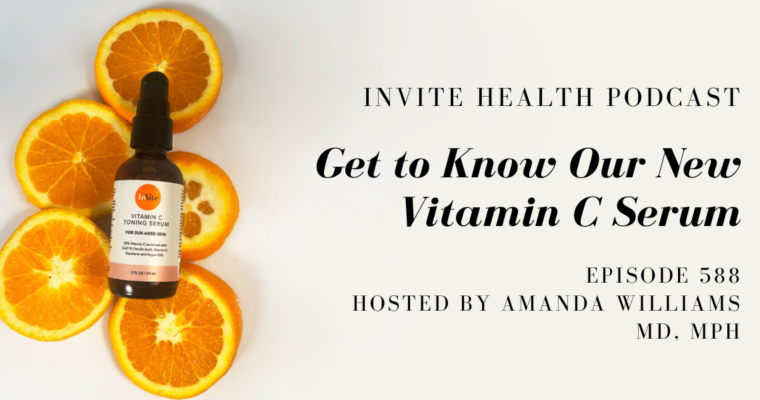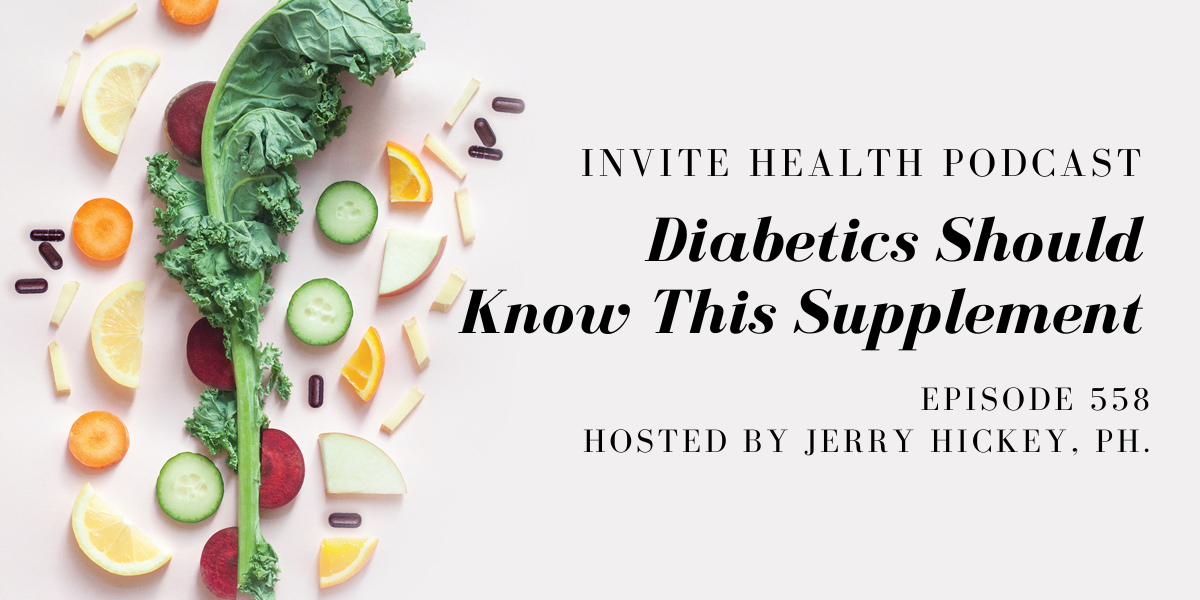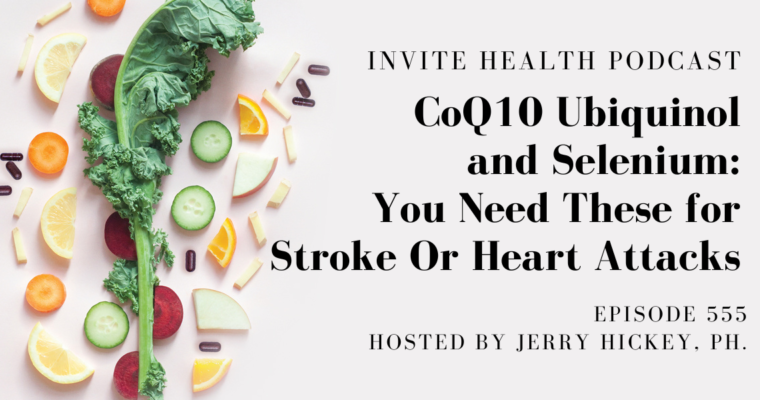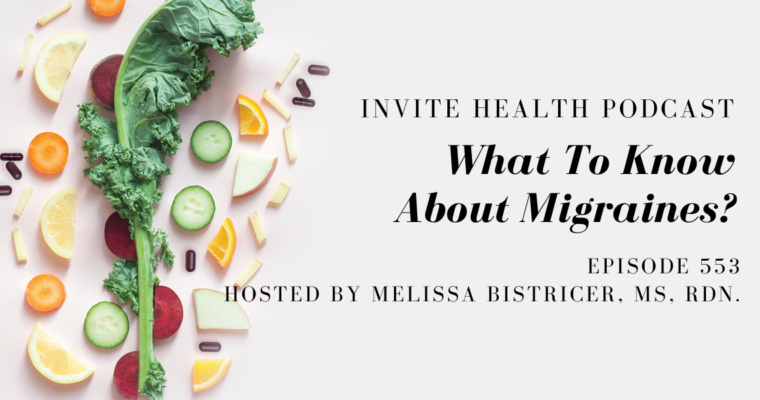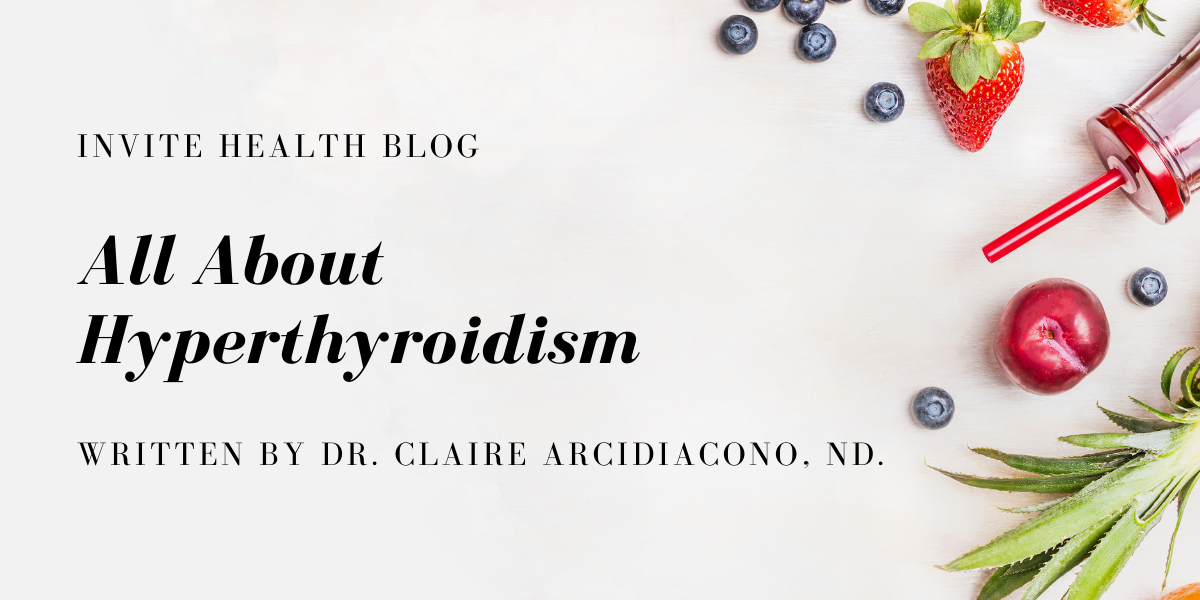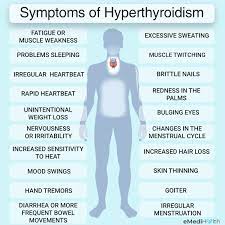Diabetics
Subscribe Today!
Please see below for a complete transcript of this episode.
Diabetics Should Know This Supplement – InViteⓇ Health Podcast, Episode 558
Hosted by Jerry Hickey, Ph.
*Intro music*
InViteⓇ Health Podcast Intro: Welcome to the InViteⓇ Health Podcast, where our degreed healthcare professionals are excited to offer you the most important health and wellness information you need to make informed choices about your health. You can learn more about the products discussed in each of these episodes and all that InViteⓇ Health has to offer at www.invitehealth.com/podcast. First time customers can use promo code PODCAST at checkout for an additional 15% off your first purchase. Let’s get started!†
*Intro music*
Jerry Hickey, Ph. : [00:00:41] There’s a supplement that’s at the core of metabolism. It was discovered in the early 20th century in Japan. A great deal of research started in the 1950s down in Texas. It’s called Coenzyme Q10, it’s a very safe very beneficial supplement. Many people require it other people will derive great benefit from it if they add it to their diet. But some people absolutely require it and among these are diabetics. So coenzyme Q10 has to be converted to Ubiquinol. So coenzyme Q10 is not yet active. The body has to metabolize it. In other words, convert it into something useful, which is called Ubiquinol and once we make that conversion. It gives us a great deal of energy, it’s good for our brain, it’s good for our eyes, it’s good for our kidneys, it’s good for a nerves, it improves muscle function, it’s great for the heart, it does many, many major activities because it’s at the core of energy production.† [00:01:45]
[00:01:47] So it contributes to many activities, but there’s kind of a ratio that’s not completely established at this point. So the body should be roughly 60% active Ubiquinol to about 40% CoQ10. That’s roughly how it should be in healthy people. The problem is diabetics as well as some other segments of the population but there’s many diabetics. Diabetics fail to make the conversion. So instead of being about 60% active Ubiquinol to about 40% CoQ10, it’s quite the opposite. They might be 20% active Ubiquinol or 30% active Ubiquinol to like 70 or 80% CoQ10. So they’re not getting the benefits and this is really a problem. That ratio matters because when you have less function of CoQ10, it affects the cells lining our blood vessels. We have cells lining our blood vessels called endothelial cells, and they lie like a rag on the lining of our blood vessels and they push them open. It takes a lot of work, it takes a lot of energy. So it needs a significant amount CoQ10 and when you have CoQ10 especially active form Ubiquinol the blood vessels don’t work as well. And this leads to a little bit of inflammation, but certainly circulatory problems. So circulation diminishes too many organs and tissues throughout the body.† [00:03:14]
[00:03:16] So as Ubiquinol levels decline in diabetics, there’s poor circulation to the nerves and they start to develop diabetic nerve disease, which is called peripheral neuropathy. They start to develop diabetic kidney disease, diabetic nephropathy, they start to develop diabetic eye disease, diabetic retinopathy. But also other vascular issues come up, increased risk of a stroke, increased risk of dementia, of course, heart disease, which is rampant in diabetics. And the problem also in the legs, they develop peripheral vascular disease, which is the same as heart disease, but it’s affecting other blood vessels, in this case the legs and peripheral vascular disease and diabetics. If they already have preexisting nerve damage and have a wound on their foot, their immune system doesn’t work well. They tend to get infections and the sores in their feet. This can turn gangrenous and because they don’t feel it, they don’t even know it’s there. The poor circulation has damaged the nerves and it can lead to amputations. So coenzyme Q10 is very important for diabetics, especially the active form, which is called Ubiquinol.† [00:04:31]
[00:04:34] So welcome to my episode, diabetics need to know this supplement. My name is Jerry Hickey, I’m a licensed pharmacist specializing in nutrition, which I’ve studied for many, many decades, more than I care to say. You can find all of the InViteⓇ Podcast episodes for free wherever you listen to podcast, or just go to invitehealth.com/podcast. And if you could please subscribe and leave us a review, it would be helpful to us. You can also find us on Instagram, Facebook and Twitter at InViteⓇ Health.† [00:05:03]
[00:05:05] So there’s whole lot to say about Ubiquinol and diabetics. So diabetics fail to convert coenzyme Q10 adequately to Ubiquinol. And this is a problem, diabetes is not just a disease of sugar, it’s a disease of metabolism, poor energy, fatigue, inflammation all of these things are affecting diabetics. They have an increase in all different bad blood values, like their apolipoprotein- B goes up. It’s really important that’s the bad part of bad cholesterol. Their good cholesterol drops, good cholesterol is kind of like a vacuum cleaner it sucks the fats out of the heart’s arteries, keeping the heart nice and clean and helping to prevent heart disease and hardening and thickening of the arteries. Triglycerides go up, triglycerides are a kind of fat in the blood normally we would use it for energy, but when it’s very high, it invades organs and tissues such as our heart and our kidneys and even our lungs, certainly our liver, even our muscles. And it’s disastrous because it inflames the tissues and leads to stiffening of tissues by creating scar tissue. It also increases the risk of stroke dramatically. VLDL, a very nasty type of cholesterol, very low density cholesterol goes up.† [00:06:22]
[00:06:24] So many of these things, to a degree, are affected by your Ubiquinol. So Ubiquinol is the active version of Coenzyme Q10. Now that are several Chinese manufacturers of Ubiquinol, I am not familiar with them. I’m familiar with Kaneka, which is a Japanese manufacturer of Ubiquinol, but they make it in the great state of Texas and it’s a really high quality it’s the only CoQ10 made in America. It’s the only natural CoQ10, it’s the only body ready, fully active CoQ10. But the studies show it’s absorbed much better in humans and it works much better. So it’s really important for diabetics to take Ubiquinol, hey listen even going on CoQ10 will help them, but Ubiquinol is absorbed and utilized better than CoQ10. They really, it’s the active form they really need to switch to Ubiquinol. So Duke University down in South in conjunction with a whole bunch of Universities in Australia, the University of New South Wales, University of Sydney, the Garvan Institute of Medical Research, they took samples of all different people and they found that in the samples of tissues from people who had blood sugar problems, we called them disgraces, abnormal blood sugar, people who had elevated blood sugar, people who had pre-diabetes, people who had diabetes, that there was much lower levels of Ubiquinol and coenzyme Q10 in a lot of their tissues, like their muscle tissues.† [00:07:59]
[00:07:59] Don’t forget your heart’s a muscle and in their fat tissues and don’t forget your brain is made out of fat. Pretty much. When I gave these people with sugar problems, when they raised a Ubiquinol level with a supplement, it was reversing insulin resistance and it was reversing pre-diabetes. So that’s rather amazing. So the tissues were working better. So there were studies showing that if you give a type two diabetic 200 milligrams of Ubiquinol a day, it significantly lowers their blood sugar. They look at a value called HbA1C, that’s an important figure for diabetics to understand. HbA1C is you know what? Let me explain that because it’s a really interesting concept. † [00:08:45]
[00:08:46] Sugar attaches to hemoglobin at a very slow rate, takes about three months to see how much sugar has attached to hemoglobin. Hemoglobin is the red stuff in your red blood cells that carries oxygen. So sugar attaches to hemoglobin at a very slow rate. And the amount of sugar that attaches to the hemoglobin over a three month period, it takes a good three months to really get a good feeling for how much is attaching to the hemoglobin. So you can only check it every three months really will indicate if your sugar is normal. So a normal HbA1C which is called Glycosylated hemoglobin or the amount of sugar that’s a touch hemoglobin. A normal one would be like 5.4, 5.3, 5.5. That’s mine, mine generally about 5.3, pre-diabetes in most labs is between 5.7 and 6 and full blown diabetes is over 6. So when I gave diabetics in this research 200 milligrams of Ubiquinol, it consistently lowered their blood sugar and improved their HbA1C. Other research indicates that when you raise Ubiquinol and people, it helps with chronic kidney disease, their kidneys are filtering out toxins better. That’s diabetes is the number one cause of chronic kidney disease. It reduces nerve pain and helps heal nerves. It lowers risk of heart attacks and strokes. So there’s a study in the British Journal of Nutrition. Now, they used our Ubiquinol in the study. It was the InViteⓇ Ubiquinol, the Kenuki Ubiquinol. We used the Kenuki Ubiquinol and it was kenuki Ubiquinol used in the study. They compared Ubiquinol to placebo in people with type two diabetes and they found that Ubiquinol was reducing insulin resistance. Insulin you release insulin while you’re eating to take the excess sugar out of your blood, it stores it away. Like in your liver and in your muscles and in your fat cells. So if the insulin isn’t working well, the sugar stays high. So it was reversing insulin resistance. It was improving insulin sensitivity. You needed less insulin for it to function. That’s great because by the time you’re a diabetic, about half the cells in your pancreas that produce insulin have been blown out. They’re gone. So there’s a lot of stress on the pancreas when you have pre-diabetes and diabetes. And they found improving insulin sensitivity, of course, allows less work by the pancreas. You know, pancreatic cancer and pancreatitis are much more common in diabetics than general public. It Improved the ratio of good cholesterol, which is called HDL, or high density lipoprotein to bad cholesterol, which is LDL. That’s good because the HDL acts like a vacuum cleaner and sucks the fats out of the arteries of the heart to keep them clean so you don’t get stiffening and thickening of the blood vessel, you don’t have coronary heart disease, a lower risk of coronary heart disease when your HDL is a bit higher, because coronary heart disease is the number one killer in the world’s number one killer in the United States.† [00:11:49]
[00:11:51] But they also found that it was lowering the blood sugar. It absolutely affected blood sugar. So this is all good. And they’ve done studies where they’ve added Ubiquinol to diabetes drugs getting improved blood sugar control. And it was very safe to add because you’re supposed to have this stuff and you when diabetics do not have it, so you’re just reversing the diminution and Ubiquinol levels when you take the supplement like this in diabetics. It also increased antioxidant capacity, that’s really important. Diabetics are very inflamed. The inflammation in the brain, caramelize brain tissue, the mallard reaction, and they have a higher incidence of stroke and they have a higher incidence of Parkinson’s disease or movement disorder, and they have a higher incidence of Alzheimer’s disease. The elevated blood sugar and the free radicals generated by fewer antioxidants damages the back of the eyes and they develop diabetic retinopathy, they also develop cataracts, they develop blood vessel problems, circulatory problems, all kinds of issues. And a lot of it has to do with decreased antioxidant capacity. Ubiquinol host bring back their antioxidant levels.† [00:12:55]
THE TOOLS YOU NEED TO LEAD A HEALTHY LIFE WITH DIABETES, PART 1 – INVITE HEALTH PODCAST, EPISODE 9 >> Listen Now!
[00:12:57] Now, just a little sidebar here. We’ve done a number of podcast episodes on diabetes and supplements for diabetes and other things for diabetes. And we’ve done a number of podcasts on heart disease for InViteⓇ and also on Ubiquinol. And in some of my other podcast episodes, I speak about Ubiquinol lowering inflammation in general, which is called HS-CRP, HS-CRP is something released by your liver when you’re inflamed, highly sensitive CRP, C-reactive protein, and it indicates that there’s inflammation in the heart. So Ubiquinol lowers HS-CRP, it lowers B-Type Natriuretic peptide, it lowers troponin T. All of these things indicate that Ubiquinol helps protect your heart. It helps protect your heart. But the Ubiquinol also helps foster more energy. Diabetics have a poor time with their energy. Now, beyond that, diabetes is a major cause of heart issues. There’s a study from Sweden where they gave older people, they were raising the blood levels of Ubiquinol over a five year period. And they found that it was cutting back on the number of heart attacks and strokes and problems with the heart. There’s been quite a few studies like that, and a major cause of heart disease is diabetes. Ubiquinol can help. It’s not the only answer, but it can help protect them from heart problems. Now there was a study from the University of Colorado at Boulder. One of my friend’s kids lives there. It’s in the journal Hypertension, which is one of the major journals of the American Heart Association. And it’s giving older folks like me supplements to raise their Ubiquinol level. These people are between the age of 60 to 79. It reversed age related changes to our circulatory system by 15 to 20 years. This is really important because it’s worse in diabetics.† [00:15:12]
[00:15:15] So Ubiquinol boosts coenzyme Q10 levels dramatically, and it’s the active form it’s absorbed better than regular CoQ10. That’s a the core pf metabolism but not only does diabetes lower your Ubiquinol levels, so does aging. The level of Ubiquinol starts to decline at the age of 40 by about 1% per year, and you’re fifties by about 2% per year in your sixties by about 3% per year. So by the time you’re like 70, the amount of Ubiquinol in your heart, you know, your heart’s pumping blood 60 to 80 times per minute needs a lot of energy and stamina. But the amount of Ubiquinol in your heart has dropped, like between 70 and 75%. So it’s really important for older people. It’s really important for people heart issues, and it’s really important for diabetics. They show that Ubiquinol in the general public and in diabetics helps protect them from heart attacks and strokes, has protective tissues in the back of the eyes should they have a lower risk of diabetic retinopathy? It gives the brain energy and helps protect the brain, it improves healing, it’s good for the gum disease, which is common in diabetics. It’s good for circulation in general, it’s good for their nerves, it’s good for their kidneys. It’s really an important supplement.† [00:16:28]

[00:16:32] Interestingly, in one of our Ubiquinol products we added some Panax ginseng. Panax ginseng is Asian ginseng, sometimes it is called Chinese ginseng or Korean ginseng. We get our Panax ginseng from people who grow it in Texas, by the way, and Panax ginseng has to be grown for at least five years before it’s functional. So ours is grown for ten years. So in the journal Nutrients, they did a systematic review. They did a comprehensive assessment of existing research. That’s a systematic review. Then they whittle it down to the best quality, most reliable research. That’s called a met and meta analysis. Over 20 studies were included. So a meta analysis gives you a lot more people, a lot more researchers, a lot more data. So it tells you if something is real or not. So in this over 20 human clinical trials in patients with diabetes and in patients with prediabetes, giving them a high amount of chance and like two grams a day significantly reduced their bad cholesterol, LDL, significantly reduced triglycerides. These are two types of greasy fats that are very dangerous in diabetics and diabetics their blood is like a jelly donut. All the fats and sugars are mixing together it’s really dangerous for them. So the Ubiquinol has been shown to lower the bad cholesterol, the lower triglycerides, the lower their sugar it’s all very helpful. It’s not the only answer, it’s part of the answer. It lowered their blood pressure if their blood pressure was elevated, not dramatically, but several points. And it did this by making the blood vessels work better, which is what you want, because in diabetics they typically have poor blood vessel function. And in fact, many of them have disease blood vessels after a while. It also improved our HDL good cholesterol. The vacuum cleaner that sucks the bad cholesterol at their heart and it improved their insulin resistance. So, yes, ginseng can be reliably helpful because it’s good for the brain and memory, it’s good for the heart, it’s good for blood pressure, it’s good for blood fats, that’s even good for the immune system. So I’m not against using ginseng in diabetics. The question is, how long do you use it for? Do you stay on it for six months? Do you stay on it for six weeks? Nobody’s really done that kind of research. But I don’t see a problem with taking a low amount of ginseng every day in diabetics, panax ginseng.† [00:19:07]
[00:19:07] Now there’s other nutrients besides Ubiquinol and Panax ginseng that are reasonable for diabetics to use. For instance the mineral magnesium and a mineral zinc are lost in the urine of diabetics they lose it in the urine, so they always have lower levels than you think they would have. Zinc is needed for protecting the brain, zinc is needed for hearing, zinc is needed for your sense of taste and smell, zinc is needed for healing, zinc is needed for your thyroid to function for metabolism, zinc is needed for you to digest and absorb your food. But zinc is also needed to control your blood sugar. They’re also losing magnesium, magnesium is needed to control your blood pressure, good brain function, sleeping at night, immune system function. Magnesium is needed to release melatonin for the immune system and to help prevent cancer and and to sleep at night. Magnesium is needed to activate vitamin D. So lacking these two minerals because diabetics are losing them in their urine is is an awful thing. Diabetics need to take magnesium and zinc twice a day. Same with vitamin D, especially in obese diabetics. In obese diabetics they lack, vitamin D gets trapped in their fat cells so it’s not available to their immune system or healing or their bones or their heart or their memory or their eyes or anything. So obese people in general need more vitamin D than the general public does, but also because they’re lucky magnesium, they can’t convert vitamin D into the active form. So all diabetics who see me as a client, I tell them, you need magnesium, you need zinc, you need vitamin D. I generally do this by giving them a powdered multivitamin twice a day, it’s called multi energy plus by Dr. Pressman.† [00:20:56]
[00:20:56] But also, diabetics cannot fully utilize vitamin B one. Vitamin B one is very important for brain function and memory and also to control your blood sugar. It affects something called a transketolase system. So they need a little bit of vitamin B one twice a day. Diabetics do not use vitamin C very carefully. They are effectively and efficiently. So they need vitamin C throughout the day. And that’s important because vitamin C protects the eyes, vitamin C protects liver, vitamin C protects the heart, vitamin C makes you you cannot make human tissue without vitamin C, but vitamin C also is one of the major nutrients that protects the brain from dementia. Chromium and vanadium are needed to help balance blood sugar. But just a warning, most supplements use way too much vanadium, you just need a tiny bit of vanadium. Then this specific herbs we’ve done a number of podcast episodes on Herbs for Diabetes that really work. Phase two is something we’ll look at, phase two is a product where it’s been used of many human clinical trials, and that blocks the absorption of sugar from your food. So if you take a couple of phase two capsules before a meal, you’ll trouble the sugar from the meal. That can only be beneficial. Another nutrient to look at is grape seed grape. We’ve done podcast episodes on grape seed for diabetics. You should listen to those.† [00:22:16]
GRAPE SEED EXTRACT FOR PEOPLE WITH DIABETES, PART 1 – INVITE HEALTH PODCAST, EPISODE 74 >> Listen Now!
[00:22:18] So I want to thank you for listening to today’s podcast episode. You can find all of our episodes for free wherever you listen to your podcast, or just go to invitehealth.com/podcast and please, you know, leave a review and subscribe. You can also listen to InViteⓇ us on Facebook, Twitter and Instagram. I want to thank you for listening today. Hope to see you next time in another episode of the InViteⓇ Health Podcast, we have a number of doctors helping us to podcast at this point, so pretty much you can cover any health condition with the podcast supplied by InViteⓇ Health. And thank you so much for listening. Jerry Hickey signing off. † [00:22:18]
*Exist Music*


